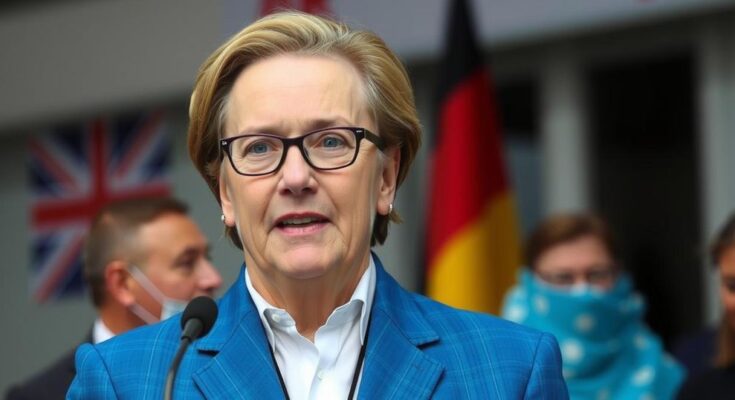The far-right AfD party, led by Alice Weidel, is polling second ahead of Germany’s February elections. Weidel advocates strict immigration policies and Germany’s exit from the eurozone. The party’s rise could significantly influence the political landscape amid rising populism in Europe.
The Alternative for Germany (AfD), a far-right political party, has emerged as a significant contender in the upcoming general election scheduled for February. Notably, the party’s candidate for chancellor, Alice Weidel, is positioning herself to attract voters with her stark policies, advocating for stringent immigration controls and proposing that Germany exit the eurozone. Since its establishment in 2013, the AfD has garnered substantial support, currently polling as the second most popular party ahead of the election.
Alice Weidel’s campaign highlights her extreme views, including a controversial stance on nuclear energy, advocating for a reversal of Germany’s previous decision to phase out nuclear power. Her assertive rhetoric is designed to resonate with disaffected voters who may be drawn to her ideas amid political upheaval and economic concerns. The AfD’s rise is marked by massive support, raising questions about its potential influence in shaping German politics in the foreseeable future, given Germany’s diverse political landscape.
The growing prominence of the AfD has not been without contention, evident from the protests that have arisen against far-right ideologies. As the election date approaches, the question remains whether Weidel’s controversial platform will connect with the electorate and allow the AfD to solidify its position as a major force in the Bundestag. Political analysts, such as those from the Alliance of Democracies Foundation and the Center for European Policy Analysis, are closely monitoring these developments as they assess the implications of the AfD’s ascent on European politics.
The Alternative for Germany (AfD) party was founded in 2013 initially as a Eurosceptic party advocating against the euro currency, but it has since evolved into a broader right-wing populist entity. The party has capitalized on socio-political discontent, particularly concerning immigration policies and economic governance, positioning itself as a voice for those disillusioned with mainstream political parties. Its significant rise in polls leading up to the February general elections reflects a broader trend of rising populism across Europe.
In summary, the AfD, with Alice Weidel as its chancellor candidate, is poised to impact the upcoming elections significantly. Weidel’s aggressive immigration policies and economic strategies could attract the support of a substantial voter base, challenging the traditional party dynamics within Germany. As the February elections approach, scrutiny over the AfD’s platform and voter reactions will be critical in determining their political trajectory and influence.
Original Source: www.aljazeera.com




